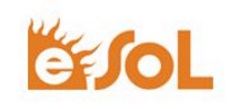
eSOL, a leading developer of real-time embedded software solutions, announced the release of eMCOS POSIX, a POSIX-compliant profile for eMCOS, a world-first commercial real-time operating system (RTOS) that provides scalable support from single to multi- and many-core processors. eMCOS POSIX will accelerate research and development and shorten product development times by facilitating the use of Linux software assets and engineering resources, including open source software (OSS) such as the Robot Operating System (ROS) framework for robotic control and the Autoware software for autonomous driving systems. eMCOS POSIX provides superior real-time capabilities and reliability for embedded systems that require a high level of computing power and operate on an autonomous and distributed basis, such as autonomous driving systems, advanced driver assistance systems (ADAS), the industrial IoT, and other applications that utilize cutting-edge technology including artificial intelligence (AI), deep learning and computer vision.
eMCOS is a POSIX-compliant RTOS that complies with POSIX 1003.13 PSE 53 and provides full support for multiple processes and threads, loadable processes, and shared libraries. It also provides a multiprocessing environment for multiand many-core systems with distributed memory, allowing the use of POSIX inter-process communications (IPC) for communication with different scheduling clusters and hardware clusters. It is designed to optimize performance while maintaining the robustness of a POSIX RTOS with a distributed microkernel architecture.
Unlike conventional RTOSs that use a single kernel to manage multiple cores, eMCOS employs a distributed microkernel architecture with a separate microkernel installed on each core. This provides the scalability to support not only different numbers of cores but also heterogeneous hardware configurations with a mix of device architectures, such as FPGAs, GPUs, and microcontrollers with on-chip flash memory. Along with eMCOS POSIX, eMCOS is made up of a number of profiles, including the eMCOS AUTOSAR profile for AUTOSAR. By selecting the appropriate profile to suit system requirements, it is easy to configure distributed systems that combine POSIX and AUTOSAR applications running on separate processors. Supported devices include the MPPA®-256 from Kalray and RH850 series from Renesas Electronics as well as the various ARM cores widely used in embedded systems. Because eMCOS is not designed for particular processor architectures or instruction sets, the intention is to add support for other processors in the future.
Approved as a Premium Member of AUTOSAR in April 2016, eSOL is participating in the formulation of AUTOSAR specifications, including its next-generation Adaptive Platform specification. eSOL is also looking to utilize eMCOS POSIX in Adaptive Platform, which assumes the use of a POSIX OS.
For application development, eSOL provides the eBinder integrated development suite. eBinder includes system analysis tools and other utilities designed specifically for eMCOS. eSOL will comprehensively support the design and development of multi- and many-core systems by providing the eSOL MBP model-based parallelization tool and consulting services that combine technology and other know-how acquired from extensive experience with automotive system development.
eMCOS POSIX will be exhibited at Embedded World 2017 (Tue. March 14 to Thu. March 16, 2017 at Exhibition Centre Nuremberg in Germany).
“eMCOS POSIX allows the use on embedded systems of the extensive range of commercial and open source software that has been developed for Linux and other UNIX-based OSs,” said Masaki Gondo, Software Chief Technology Officer and General Manager of Technology Headquarters at eSOL. “It enables the inclusion of artificial intelligence, deep learning, and sensor fusion in systems such as those for autonomous driving, ADAS, robots, medical cameras, and IoT devices. For these systems that demand a high level of computational performance, eMCOS provides powerful support for R&D and for shortening product time-to-market while ensuring high reliability and superior real-time capabilities.”
Source: eSOL
Advertisement
Learn more about Electronic Products Magazine





